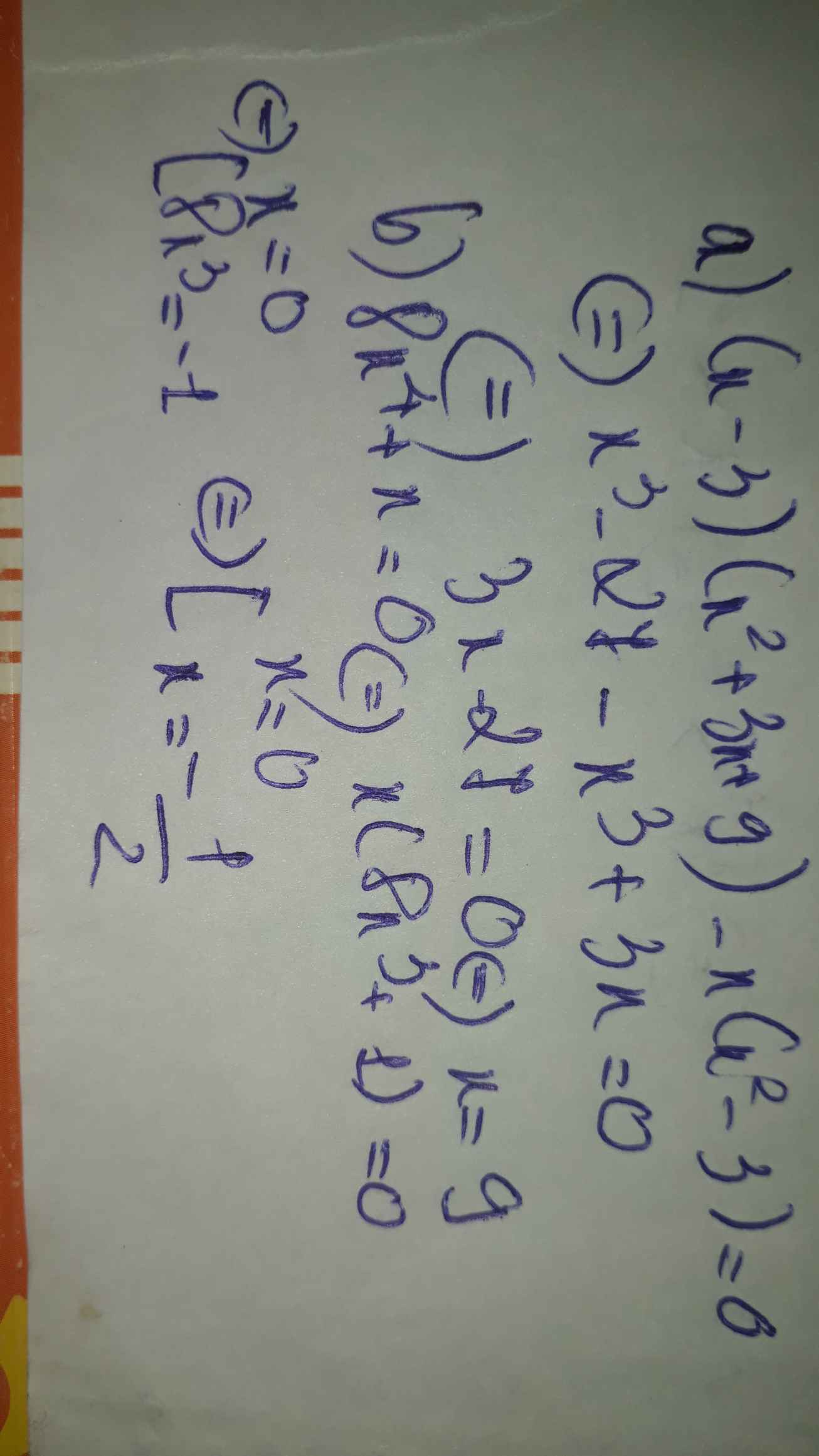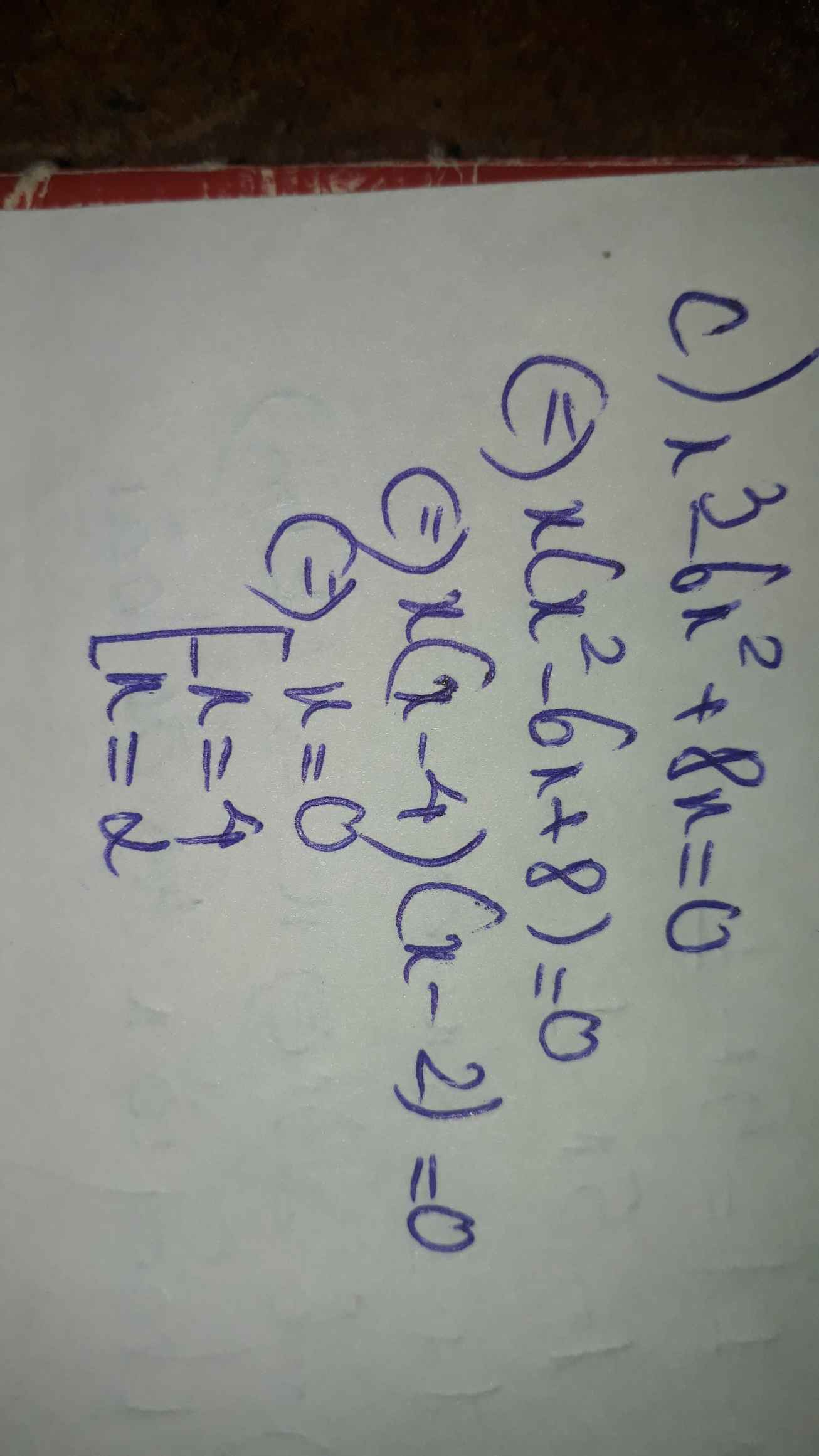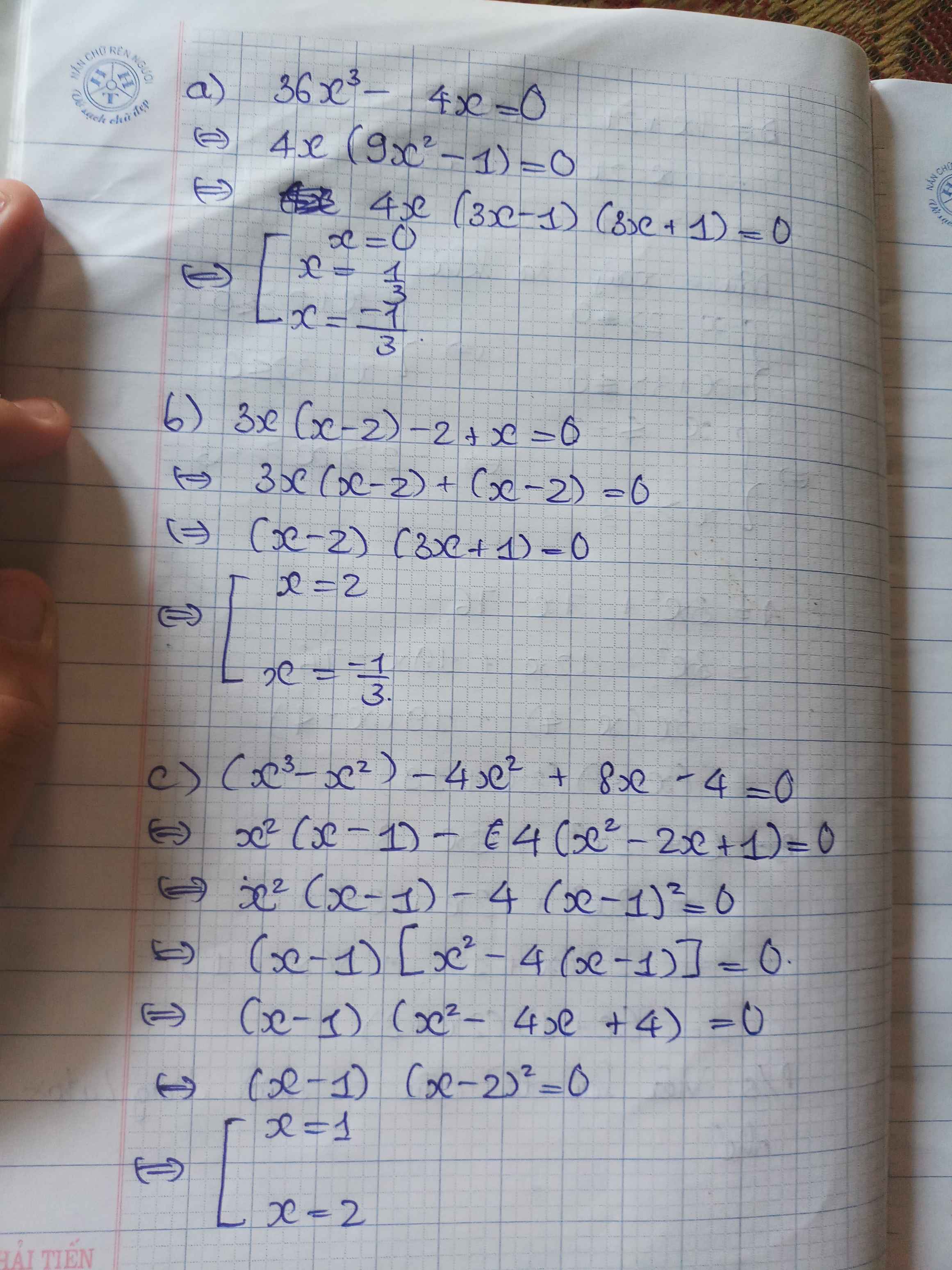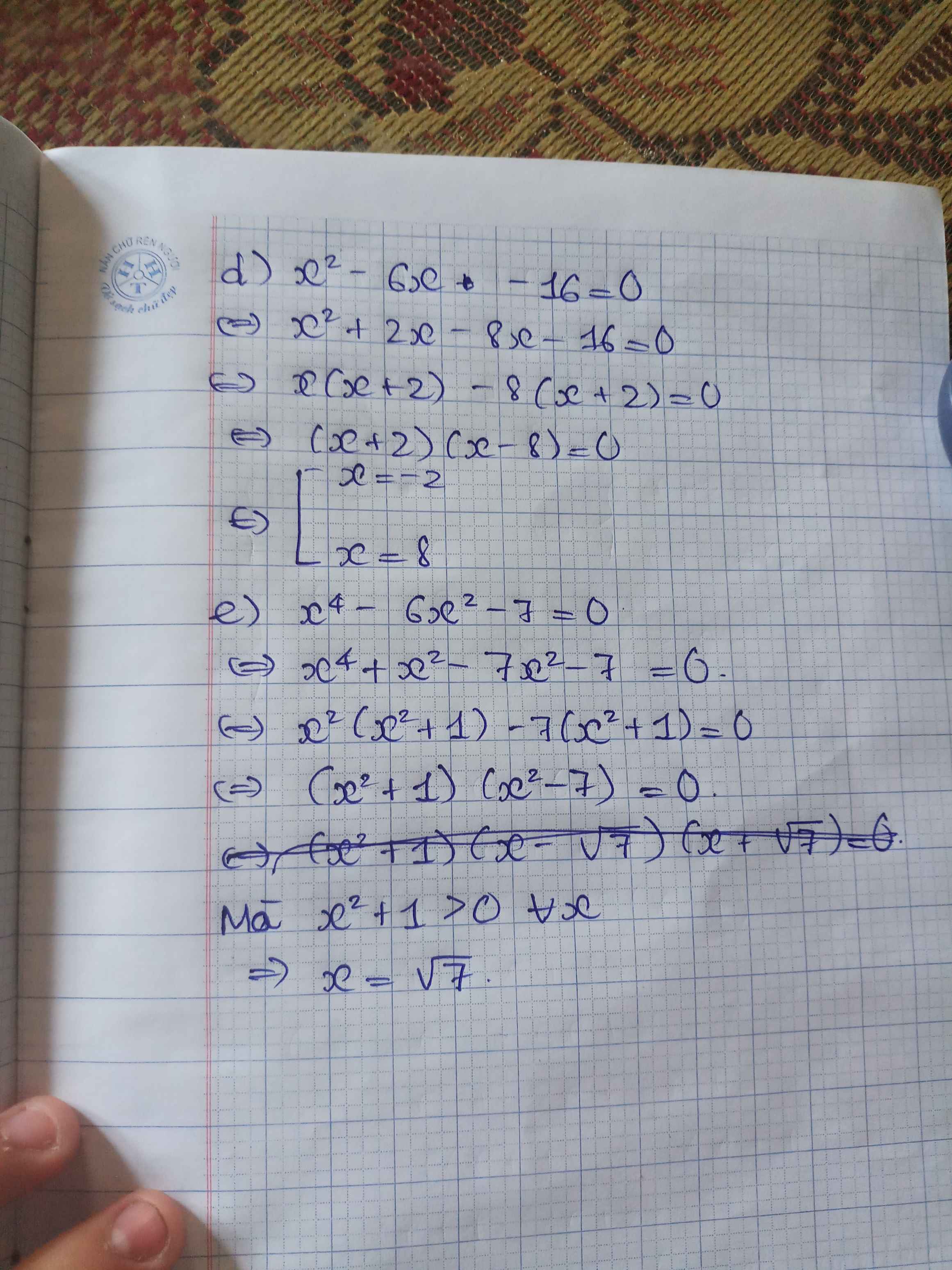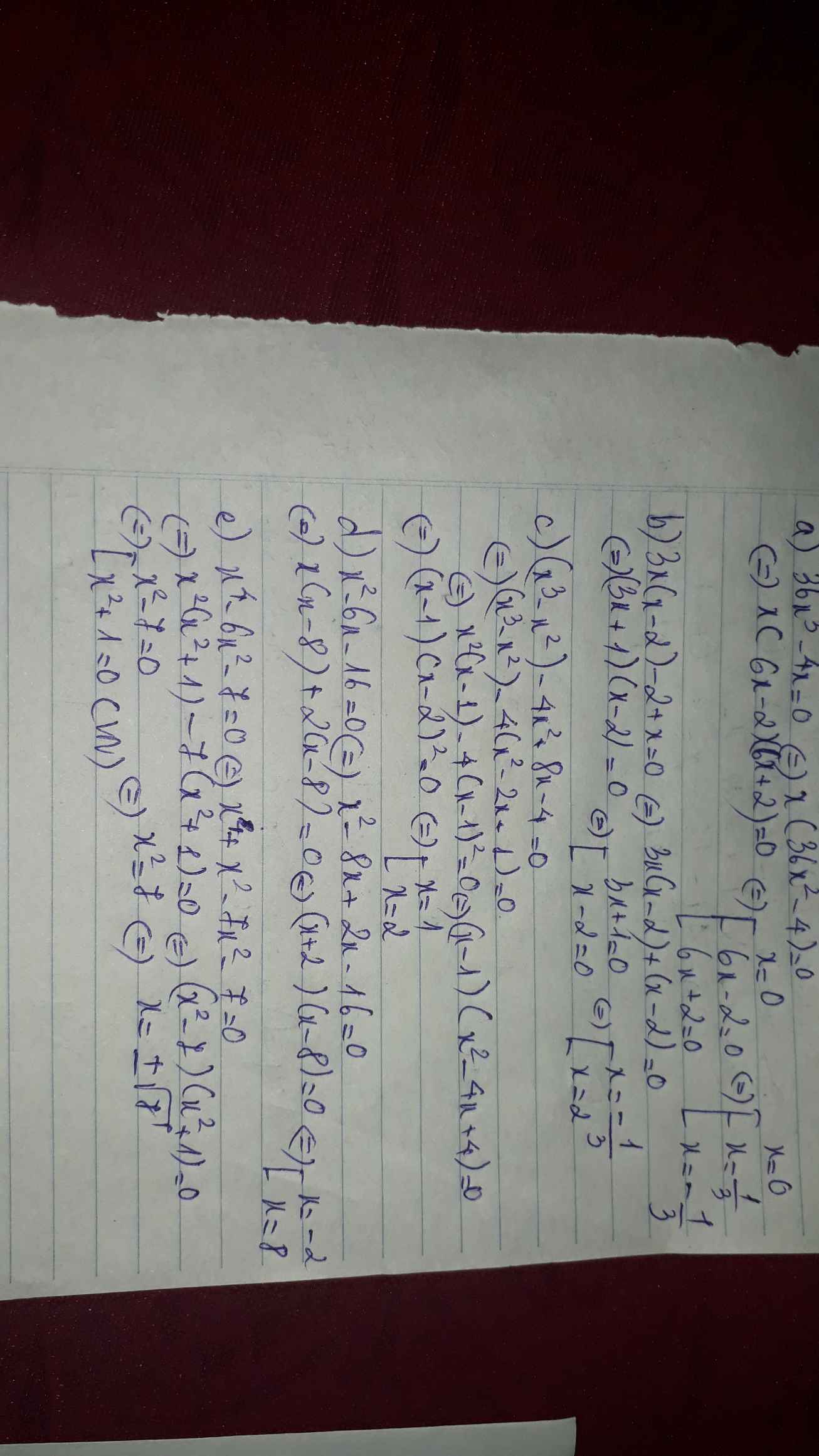Tìm x:
a)(x+3)2-4x-12=0
b)x(x+5)(x-5)-(x-3)(x2+3x+9)=7

Những câu hỏi liên quan
Tìm x:
a) (x-3)(x2+3x+9)-x(x2-3)=0
b) 8x4+x=0
d) x3-6x2+8x=0
a: Ta có: \(\left(x-3\right)\left(x^2+3x+9\right)-x\left(x^2-3\right)=0\)
\(\Leftrightarrow x^3-27-x^3+3x=0\)
\(\Leftrightarrow x=9\)
b: Ta có: \(8x^4+x=0\)
\(\Leftrightarrow x\left(8x^3+1\right)=0\)
\(\Leftrightarrow x\left(2x+1\right)\left(4x^2-2x+1\right)=0\)
\(\Leftrightarrow\left[{}\begin{matrix}x=0\\x=-\dfrac{1}{2}\end{matrix}\right.\)
Đúng 0
Bình luận (0)
Tìm x:
a) 36x3-4x=0
b) 3x(x-2)-2+x=0
c) (x3-x2)-4x2+8x-4=0
d) x2-6x-16=0
e) x4-6x2-7=0
a)9x2 – 49 = 0
b)(x – 1)(x + 2) – x – 2 = 0
c)(4x + 1)(x - 2) - (2x -3)(2x + 1) = 7
d)x(3x + 2) + (x + 1)2 – (2x – 5)(2x + 5) = 0
e)(x + 3)(x2 – 3x + 9) –x(x – 1)(x + 1) – 27 = 0
f)(4x-3)^2-3x(3-4x)=0
\(a,\Leftrightarrow\left(3x-7\right)\left(3x+7\right)=0\Leftrightarrow\left[{}\begin{matrix}x=\dfrac{7}{3}\\x=-\dfrac{7}{3}\end{matrix}\right.\\ b,\Leftrightarrow\left(x+2\right)\left(x-1-1\right)=0\\ \Leftrightarrow\left[{}\begin{matrix}x=2\\x=-2\end{matrix}\right.\\ c,\Leftrightarrow4x^2-7x-2-4x^2+4x+3=7\\ \Leftrightarrow-3x=6\Leftrightarrow x=-2\\ d,\Leftrightarrow3x^2+2x+x^2+2x+1-4x^2+25=0\\ \Leftrightarrow4x=-26\Leftrightarrow x=-\dfrac{13}{2}\\ e,\Leftrightarrow x^3+27-x^3+x-27=0\\ \Leftrightarrow x=0\\ f,\Leftrightarrow\left(4x-3\right)\left(4x-3+3x\right)=0\\ \Leftrightarrow\left[{}\begin{matrix}x=\dfrac{3}{4}\\x=\dfrac{3}{7}\end{matrix}\right.\)
Đúng 2
Bình luận (0)
a) 9x2-49=0
(3x)2-72=0
<=> (3x-7)(3x+7)=0
th1: 3x-7=0
<=>3x=7
<=>x=\(\dfrac{7}{3}\)
th2: 3x+7=0
<=>3x=-7
<=>x=\(-\dfrac{7}{3}\)
Đúng 1
Bình luận (0)
tìm x:
a)3(2x-3)+2(2-x)=-3
b)2x(x2-2)+x2(1-2x)-x2=-12
c)3x(2x+3)-(2x+5)(3x-2)=8
d)4x(x - 1) - 3(x2-5)-x2=(x-3)-(x+4)
e)2(3x-1)(2x+5)-6(2x-1)(x+2)=-6
a: Ta có: \(3\left(2x-3\right)+2\left(2-x\right)=-3\)
\(\Leftrightarrow6x-9+4-2x=-3\)
\(\Leftrightarrow4x=2\)
hay \(x=\dfrac{1}{2}\)
Đúng 2
Bình luận (1)
Tìm x:
a) 36x3-4x=0
b) 3x(x-2)-2+x=0
c) (x3-x2)-4x2+8x-4=0
d) x2-6x-16=0
e) x4-6x2-7=0
(Mình cần gấp ạ)
a) Ta có: \(36x^3-4x=0\)
\(\Leftrightarrow4x\left(9x^2-1\right)=0\)
\(\Leftrightarrow x\left(3x-1\right)\left(3x+1\right)=0\)
\(\Leftrightarrow\left[{}\begin{matrix}x=0\\x=\dfrac{1}{3}\\x=\dfrac{-1}{3}\end{matrix}\right.\)
b) Ta có: \(3x\left(x-2\right)+x-2=0\)
\(\Leftrightarrow\left(x-2\right)\left(3x+1\right)=0\)
\(\Leftrightarrow\left[{}\begin{matrix}x=2\\x=\dfrac{-1}{3}\end{matrix}\right.\)
Đúng 0
Bình luận (0)
d) Ta có: \(x^2-6x-16=0\)
\(\Leftrightarrow\left(x-8\right)\left(x+2\right)=0\)
\(\Leftrightarrow\left[{}\begin{matrix}x=8\\x=-2\end{matrix}\right.\)
e) Ta có: \(x^4-6x^2-7=0\)
\(\Leftrightarrow\left(x^2-7\right)\left(x^2+1\right)=0\)
\(\Leftrightarrow x\in\left\{\sqrt{7};-\sqrt{7}\right\}\)
Đúng 0
Bình luận (0)
Tìm x:
a)2x3-18x=0
b)(3x-2).(2x+1)-6x.(x+2)=11
c)(x-1)3-(x+2).(x2-2x+4)=3.(1-x2)
a: Ta có: \(2x^3-18x=0\)
\(\Leftrightarrow2x\left(x-3\right)\left(x+3\right)=0\)
\(\Leftrightarrow\left[{}\begin{matrix}x=0\\x=3\\x=-3\end{matrix}\right.\)
b: Ta có: \(\left(3x-2\right)\left(2x+1\right)-6x\left(x+2\right)=11\)
\(\Leftrightarrow6x^2+3x-4x-2-6x^2-12x=11\)
\(\Leftrightarrow-13x=13\)
hay x=-1
c: Ta có: \(\left(x-1\right)^3-\left(x+2\right)\left(x^2-2x+4\right)=3\left(1-x^2\right)\)
\(\Leftrightarrow x^3-3x^2+3x-1-x^3-8=3-3x^2\)
\(\Leftrightarrow3x=12\)
hay x=4
Đúng 1
Bình luận (0)
a) 2x3-18x=0
⇔ 2x(x2-9)=0
⇔ 2x(x-3)(x+3)=0
⇔ \(\left\{{}\begin{matrix}x=0\\x=3\\x=-3\end{matrix}\right.\)
b)(3x-1)(2x+1)-6x(x+2)=11
⇔ 6x2+x-1-6x2-12x=11
⇔ -11x=12
\(\Leftrightarrow x=-\dfrac{12}{11}\)
c) (x-1)3-(x+2).(x2-2x+4)=3.(1-x2)
⇔ x3-3x2+3x-1-x3-8-3+3x2=0
⇔ 3x=12
⇔ x=4
Đúng 1
Bình luận (0)
c. (x - 1)3 - (x + 2)(x2 - 2x + 4) = 3(1 - x2)
<=> (x3 - 3x2 + 3x - 1) - (x3 - 2x2 + 4x + 2x2 - 4x + 8) = 3 - 3x2
<=> x3 - 3x2 + 3x - 1 - x3 + 2x2 - 4x - 2x2 + 4x - 8 = 3 - 3x2
<=> x3 - x3 - 3x2 + 2x2 - 2x2 + 3x2 + 3x - 4x + 4x = 3 + 1 + 8
<=> 3x = 12
<=> x = 4
Đúng 0
Bình luận (0)
Tìm x:
a)x.(x+7)-(x-2).(x+3)=0
b)(x+2)2-(x2-4)=0
a: \(x\left(x+7\right)-\left(x-2\right)\left(x+3\right)=0\)
\(\Leftrightarrow x^2+7x-x^2-x+6=0\)
hay x=-1
b: Ta có: \(\left(x+2\right)^2-\left(x^2-4\right)=0\)
\(\Leftrightarrow x+2=0\)
hay x=-2
Đúng 1
Bình luận (0)
b. (x + 2)2 - x2 + 4 = 0
<=> (x + 2 - x)(x + 2 + x) + 4 = 0
<=> 2(2 + 2x) + 4 = 0
<=> 4(1 + x) + 4 = 0
<=> 4(1 + x) = -4
<=> 1 + x = -1
<=> x = -1 - 1
<=> x = -2
Đúng 1
Bình luận (0)
\(a,\) \(x\left(x+7\right)-\left(x-2\right)\left(x+3\right)\)
\(\Leftrightarrow x^2+7x-x^2-3x+2x+6\\ \Leftrightarrow6x=0\\ \Leftrightarrow x=0\)
\(Vậy...\)
\(b,\) \(\left(x+2\right)^2-\left(x^2-4\right)=0\)
\(\Leftrightarrow x^2+4x+4-x^2+4=0\\ \Leftrightarrow4x+8=0\\ \Leftrightarrow x=-2\)
Đúng 2
Bình luận (1)
Xem thêm câu trả lời
Tìm x:
a) (x-8)(x3+8)=0
b) (4x-3)-(x+5) =3(10-x)
a) `(x-8)(x^3+8)=0`
`<=>(x-8)(x+2)(x^2-2x+4)=0`
`<=>` \(\left[ \begin{array}{l}x=8\\x=-2\end{array} \right.\) (Vì `x^2-2x+4 \ne 0 forall x)`
Vậy `A={8;-2}`.
b) `(4x-3)-(x+5)=3(10-x)`
`,=>4x-3-x-5=30-3x`
`<=>3x-8=30-3x`
`<=>6x=38`
`<=>x=19/3`
Vậy `S={19/3}`.
Đúng 0
Bình luận (0)
a) 4x – 20 = 0
b) 2x + x + 12 = 0
c) x – 5 = 3 – x
d) 7 – 3x = 9 – x
a) 4x – 20 = 0
⇔ 4x = 20
⇔ x = 20 : 4
⇔ x = 5
Vậy phương trình có nghiệm duy nhất x = 5.
b) 2x + x + 12 = 0
⇔ 3x + 12 = 0
⇔ 3x = -12
⇔ x = -12 : 3
⇔ x = -4
Vậy phương trình đã cho có nghiệm duy nhất x = -4
c) x – 5 = 3 – x
⇔ x + x = 5 + 3
⇔ 2x = 8
⇔ x = 8 : 2
⇔ x = 4
Vậy phương trình có nghiệm duy nhất x = 4
d) 7 – 3x = 9 – x
⇔ 7 – 9 = 3x – x
⇔ -2 = 2x
⇔ -2 : 2 = x
⇔ -1 = x
⇔ x = -1
Vậy phương trình có nghiệm duy nhất x = -1.
Đúng 1
Bình luận (0)
Em lớp 6 em chỉ làm dc phần a,b,c
Kết quả như sau:
a,4x-20=0
4x=20+0
4x=20
x=20:4
x=5
Đúng 0
Bình luận (0)
Xem thêm câu trả lời




